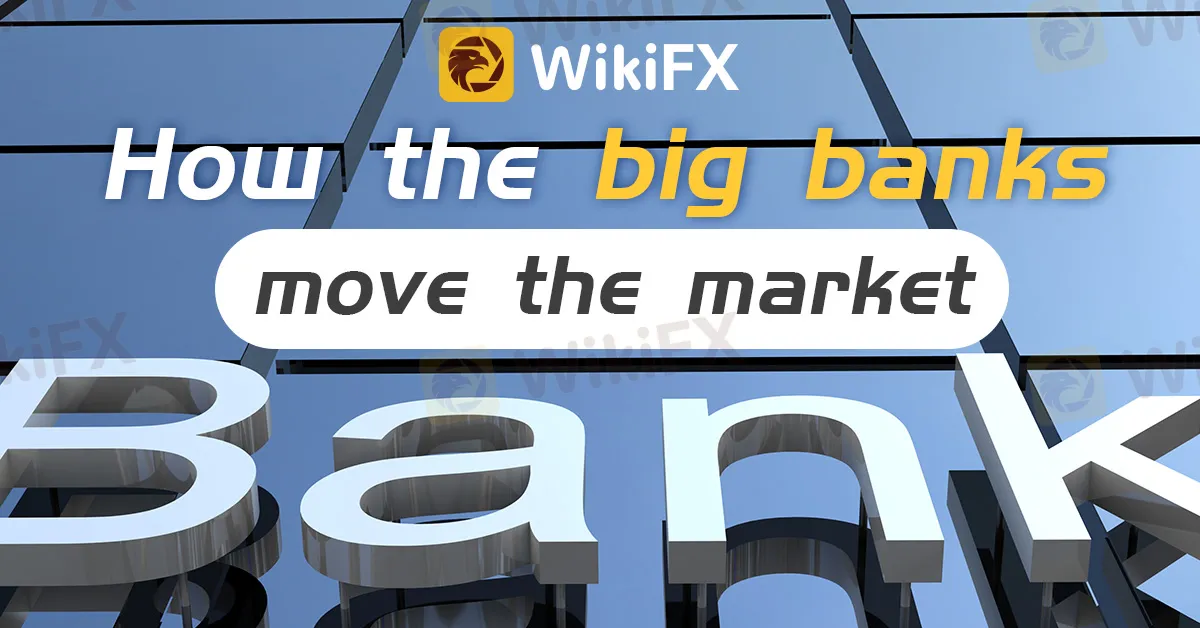简体中文
繁體中文
English
Pусский
日本語
ภาษาไทย
Tiếng Việt
Bahasa Indonesia
Español
हिन्दी
Filippiiniläinen
Français
Deutsch
Português
Türkçe
한국어
العربية
How the big banks move the market
Abstract:Forex is the largest financial market in the world, with a daily turnover of over $6.6 trillion. Large financial institutions, including major banks, dominate the Forex market, accounting for a significant percentage of the daily market volume. Banks participate in the market as both forex traders and market makers, and they use their financial clout to influence prices.

Forex is the largest financial market in the world, with a daily turnover of over $6.6 trillion. Large financial institutions, including major banks, dominate the Forex market, accounting for a significant percentage of the daily market volume. Banks participate in the market as both forex traders and market makers, and they use their financial clout to influence prices.
There are several ways in which big banks move prices of instruments in the Forex market. One of the primary methods is through their order flow. These banks deal with billions of dollars each day, making them the primary market participants. Consequently, they create order flows by buying and selling currencies in large quantities, which can lead to a shift in prices.
In recent years, high-frequency trading has become popular among big banks, allowing them to execute trades at lightning speeds. These trades are executed through computer algorithms that analyze market conditions and execute trades automatically based on pre-determined conditions. High-frequency trading allows banks to move prices quickly while taking advantage of market fluctuations with minimal risk.
Banks can also use leverage to influence the market. Leverage refers to the ability to control large positions while committing only a small fraction of the capital. Banks can leverage their positions through the use of derivatives, such as options and futures. This allows them to take on large positions and potentially move prices in their favor. However, it also exposes them to significant risks, as leveraged positions can result in significant losses.
Another way banks affect the Forex market is through their research reports and analysis. Banks have dedicated research teams that provide insights into the economic conditions of various countries and the potential impact on currency values. These reports are distributed to traders and investors worldwide, and their results can significantly impact the markets direction.
Additionally, big banks can influence Forex prices through their relationships with central banks, local governments, and other major institutions. For instance, a central bank may inform a big bank of its intention to buy or sell currency, or a government may inform a bank of planned policy changes. In both cases, the bank can then trade based on this inside knowledge, potentially moving prices in its favor.
In conclusion, big banks exert significant influence on the movement of prices in the Forex market. Their order flow, high-frequency trading, leverage, research reports, and analysis, as well as their relationships with other major institutions, all play a significant role in the market‘s direction. Understanding the role of these big banks is essential for successful Forex trading, as traders must be aware of the market’s major participants to make informed trading decisions.

Disclaimer:
The views in this article only represent the author's personal views, and do not constitute investment advice on this platform. This platform does not guarantee the accuracy, completeness and timeliness of the information in the article, and will not be liable for any loss caused by the use of or reliance on the information in the article.
Read more

New to Forex Trading in India? Here's How You Can Start and Maximize
Want to begin your forex trading journey in India? Here's a guide that will help you open and close trading positions effectively, resulting in enhanced returns and minimized risks.

How a TikTok Crypto Scam Cost One Investor RM84,000
A Malaysian woman has lost RM84,000 after falling prey to a cryptocurrency investment scam promoted through the social media platform TikTok. The 52-year-old victim was lured into the scheme by a fraudster posing as an investment advisor, according to police reports filed earlier this week.

Manual vs. Automated Forex Trading: Which One Should You Choose?
Both manual and automated forex trading have their strengths and weaknesses. Should you trade manually or use automated systems? Today’s article may give you some clues.

IFC Markets: The Broker With No License!!
When evaluating a forex broker, regulatory status is one of the most important indicators of credibility and investor protection. In the case of IFC Markets, WikiFX’s findings raise several red flags that potential traders should carefully consider before engaging with this platform.
WikiFX Broker
Latest News
Manual vs. Automated Forex Trading: Which One Should You Choose?
Scammed by a Click: He Lost RM300,000 in a Month
Revealing Factors That Help Determine the Gold Price in India
Why Regulatory Compliance Is the Secret Ingredient to Trustworthy Forex Brokers
How Are Trade Policies Affecting the Aluminum Market?
US Government Interest Grows in Victory Metals’ Rare Earths Supply
RM71,000 Lost in a Share Scheme That Never Existed
Pentagon to become largest shareholder in rare earth miner MP Materials; shares surge 40%
Delta shares jump 13% after airline reinstates 2025 profit outlook as CEO says bookings stabilized
Delta shares jump 12% after airline reinstates 2025 profit outlook as CEO says bookings stabilized
Currency Calculator


